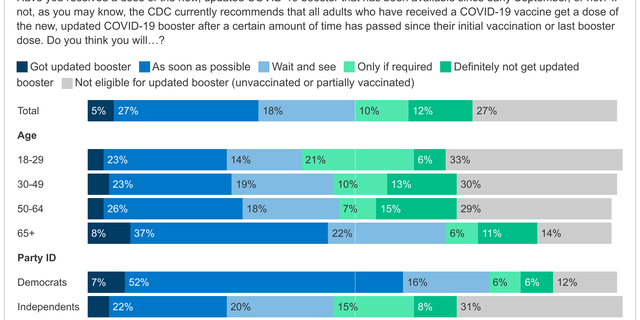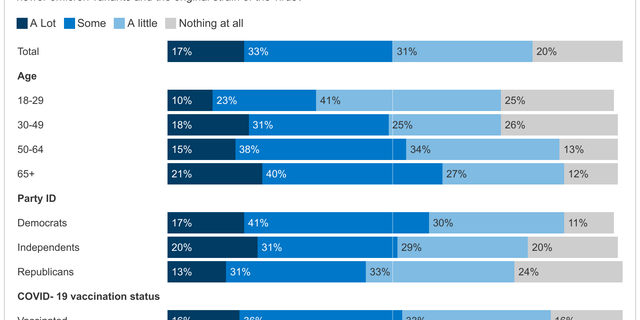Around two-thirds of adults in the United States are not planning to get the updated COVID-19 booster shots soon, according to a survey conducted by the Kaiser Family Foundation (KFF), a health policy nonprofit organization.
Only a third of adults polled said they either already received the updated shots or plan to get the booster as soon as possible, the poll found.
About 18% said they would wait and see whether they would get the new booster shot, while 10% said they would only get it if it was required. About 12% of adults surveyed said they would definitely not get the shot, while 27% said they were not eligible because they were not fully vaccinated.
About 7.6 million people received the updated shots over the first four weeks the boosters have been available, according to U.S. Centers for Disease Control and Prevention (CDC) data released on Thursday. That represents about 3.5% of the 215.5 million people in the United States aged 12 or older who are eligible to receive the shots because they have completed their primary vaccination series.
CALIFORNIA PARENTS PETITION SCOTUS OVER GAVIN NEWSOM'S COVID-INDUCED SCHOOL CLOSURES

About a third of adults say they have either received the updated bivalent COVID-19 booster dose (5%), which had been available for one to two weeks when the survey was in the field or say they plan to get the new booster as soon as possible (27%).
(KFF)
Last month, the Food and Drug Administration authorized reformulated versions of the Pfizer/BioNTech and Moderna Inc. vaccines that aim to protect against the omicron subvariants.
FAUCI ADMITS 'CERTAIN ASPECTS' OF THE GOVERNMENT'S COVID-19 RESPONSE WERE 'BOTCHED'
The reformulated shots target both the original strain of the coronavirus and the omicron BA.4/BA.5 subvariants that many are catching.
The latest KFF COVID-19 Vaccine Monitor survey found that awareness of the updated boosters was relatively modest, with about half of adults saying they’ve heard "a lot" (17%) or "some" (33%) about the new shots.

Awareness of the new vaccines is low, with only half of adults surveyed saying they had heard a lot or some about the boosters, according to the Kaiser survey.
(KFF)
Additionally, around 40% of fully vaccinated adults said they were not sure whether the new COVID-19 boosters are recommended for them. The CDC recommended that all people aged 12 and older get the reformulated COVID-19 booster at least two months after being fully vaccinated.
For the survey, KFF polled 1,534 adults from Sept. 15 to Sept. 26.
Reuters contributed to this report.
Health


